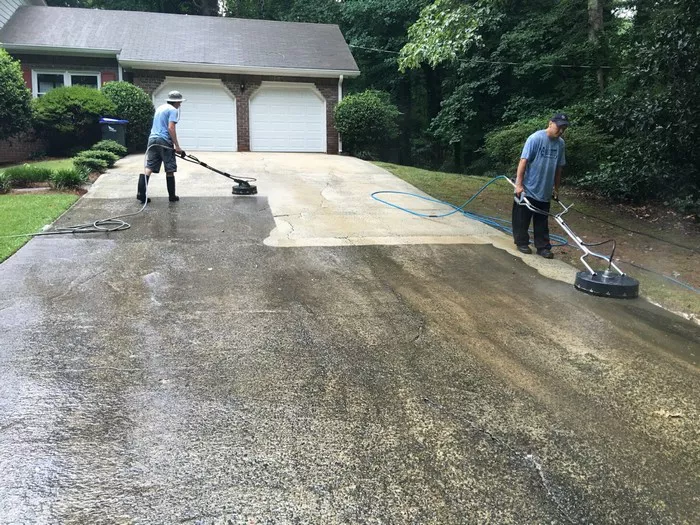Keeping your driveway clean not only enhances the aesthetic appeal of your property but also plays a crucial role in its maintenance. Power washing is a highly effective method for removing dirt, grime, and stains from driveways, but determining how often to perform this task can be a challenge. In this comprehensive guide, we’ll explore various factors that influence power washing frequency and provide valuable insights to help you maintain a pristine driveway.
Understanding Power Washing Frequency
The frequency of power washing your driveway depends on several factors, including climate, usage patterns, and the type of surface material. Here’s a detailed look at each of these factors:
Climate and Weather Conditions
The climate in which your property is located plays a significant role in determining how often you should power wash your driveway. Regions with high humidity or frequent rainfall may experience faster buildup of dirt, mold, and mildew on driveways. Similarly, areas prone to dust storms or surrounded by trees shedding pollen may require more frequent cleaning to keep the driveway looking fresh and free from debris.
Usage Patterns
The level of activity on your driveway also influences the frequency of power washing. Driveways subjected to heavy traffic, such as those in commercial properties or households with multiple vehicles, are more likely to accumulate dirt, oil stains, and other residues. Regular power washing every few months can help prevent the buildup of stubborn stains and maintain a clean appearance.
Type of Surface Material
The material of your driveway surface plays a crucial role in determining its cleaning requirements. Different materials, such as concrete, asphalt, pavers, or gravel, have unique characteristics that influence how they respond to dirt and stains:
1. Concrete driveways: While concrete is a durable material, it is susceptible to staining from oil, grease, rust, and other substances. Regular power washing every six months to a year can help remove surface stains and maintain the appearance of a concrete driveway.
2. Asphalt driveways: Asphalt is more porous than concrete and may absorb stains more readily. Power washing every one to two years is generally sufficient to keep an asphalt driveway clean, although more frequent cleaning may be necessary if it experiences heavy traffic or is located in a high-humidity environment.
3. Paver driveways: Pavers provide a visually appealing and versatile option for driveways, but their uneven surfaces can trap dirt and debris. Power washing every one to two years, combined with periodic re-sanding and sealing, can help keep paver driveways looking their best.
Factors Influencing Power Washing Frequency
1. Climate: Weather conditions such as rainfall, humidity, and pollen levels affect the rate at which dirt and debris accumulate on driveways. Regions with heavy rainfall or high humidity may require more frequent power washing to prevent mold and mildew growth, while areas with significant pollen levels may need regular cleaning to remove surface debris.
2. Usage Patterns: Driveways experiencing heavy traffic, whether from vehicles or foot traffic, are more prone to dirt buildup and staining. Regular power washing every few months is advisable for driveways with high usage to maintain cleanliness and prevent the accumulation of stubborn stains.
3. Surface Material: Different driveway materials, such as concrete, asphalt, or pavers, have unique cleaning requirements. Concrete driveways may develop surface stains over time, while asphalt driveways are more susceptible to oil spills. Understanding the characteristics of your driveway surface will help determine the appropriate cleaning schedule to maintain its appearance and longevity.
Conclusion
Maintaining a clean driveway not only enhances the curb appeal of your property but also prolongs the lifespan of the surface material. By considering factors such as climate, usage patterns, and surface material, you can determine the optimal frequency for power washing your driveway. Regular cleaning not only preserves the aesthetics of your property but also prevents damage caused by dirt, stains, and environmental contaminants. Make power washing a part of your routine maintenance schedule to ensure a pristine driveway that adds value and beauty to your home.
FAQs
Q1. How can I protect my driveway after power washing?
A1: Answer: After power washing, consider applying a sealant specifically formulated for your driveway surface to protect it from future stains and damage. Additionally, regular sweeping and maintenance can help preserve the cleanliness of your driveway between power washing sessions.
Q2. Can I power wash my driveway myself, or should I hire a professional?
A2: Answer: While DIY power washing is possible, hiring a professional ensures thorough cleaning and minimizes the risk of damage to your driveway. Professionals have the expertise and equipment to effectively remove tough stains without causing harm to the surface. However, if you choose to power wash your driveway yourself, be sure to follow safety guidelines and use appropriate cleaning solutions and techniques.
Q3. Is power washing environmentally friendly?
A3: Answer: Power washing can be eco-friendly if done responsibly. Using biodegradable detergents and capturing wastewater for proper disposal or recycling can minimize the environmental impact. Additionally, choosing low-pressure settings and avoiding excessive use of chemicals can help reduce harm to the environment while still achieving effective cleaning results.

